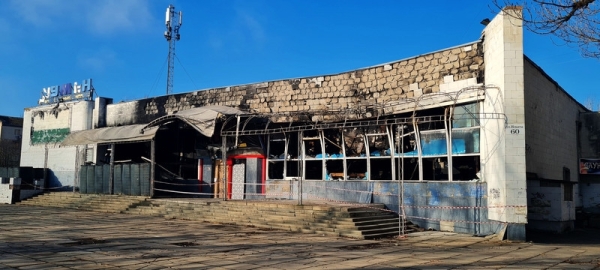Kherson — a city under siege on Ukraine’s 1,000km frontline
A war of attrition is entrenched along Ukraine’s 1,000km frontline. But in the south-east, Kherson — a city where Russian forces are just across the Dnipro River — it remains a siege.
Throughout the day from Wednesday into Thursday (1 February), it was hit 64 times, said Kherson official Oleksandr Prokudin, in a Telegram post.
-

Oksana Hrokova and her family are getting help from the International Rescue Committee, which has handed out over 600 gas cylinders to households in Kherson (Photo: EUobserver)
During a morning visit by EUobserver, also on Thursday, the city had an uneasy calm. The sun was out and the sky a clear blue. But a drive through Kherson is one that reveals an urban landscape scarred by war. Buildings destroyed. Roofs collapsed.
At her home with her three children in Kherson’s Korabelnyi district, 42-year old Oksana Hrokova remains defiant.
"This city is under constant shelling. Nobody knows what will happen in five minutes, one minute. The situation can change at any moment," she said.
"After two years of war, the most critical for us, is victory for Ukraine," she added.
It is a life encircled by war. Entry into Kherson from the Ukrainian side includes passing through a checkpoint manned by heavily-armed soldiers. Across the river on the left bank, Russian forces stand ready to pounce.
Drunk Russian soldiers
Like so many others, Kherson had woken up to the sound of explosions during Russia’s 4am invasion on 24 February. The Russian troops would later cross the Dnieper north of the strategically vital Antonivaka bridge, unopposed.
Less than a week later, they seized Kherson, along with an airport near the village of Chornobaika. They then pillaged the city.
For the next eight months, Hrokova kept her 15-year old daughter Anastasia at home, terrified she would be raped.
"By lunch, the Russian soldiers were drunk," she said. Some would steal cars and drive recklessly. Bodies were left in the streets, she said.
At the time, the predictions were dire. It was thought Ukraine would fold under a superior Russian military within a matter of days or at most, weeks.
But a surprise resistance was soon mounted. Kherson’s mayor had refused to lower Ukrainian flags from city buildings.
And on the anniversary of the city’s liberation from Nazi occupation on 13 March, 1944, thousands took to the streets to protest against the Russian invaders. Along with her neighbours, Hrokova began erecting barriers on their street.
A crackdown soon ensued as Russia took over the local government and introduced the rouble as a new currency. But by April, Ukrainian forces had reached the city’s outskirts.
Despite an announced June Ukrainian counter-offensive, Russia maintained plans to hold a referendum to integrate the region into occupied territories. In November, Ukraine liberated the city.
"We were afraid of everything. Russian soldiers were walking with their guns on the streets," said Elena Pantilieva, a 64-year old resident.
For the past few months, she has been caring for her husband Serhii who is recovering from cancer.
Their home, further up from Hrokova’s, had been without heating when Serhii returned from the hospital in Mykolaiva. But a gas cylinder from the International Rescue Committee keeps them warm, she said.
Recalling the months under Russian control, Pantilieva begins to shed tears. "The nights were the scariest," she said, echoing the drunken state of the Russians.
She points to the carpet and an arm chair hit by shrapnel that had entered through the window. Their roof had also been damaged.
But like her neighbour Hrokova, Pantilieva doesn’t think the Russians dare return to Kherson despite their close proximity across the river below.
Instead, she made an appeal for Europe and the US to step up and help Ukraine win the war against Russia. "We want the world to know what war looks like. And we no longer want to fear for our loved ones," she said.
The International Rescue Committee/ECHO is reimbursing travel expenses for EUobserver’s trip through Ukraine.

